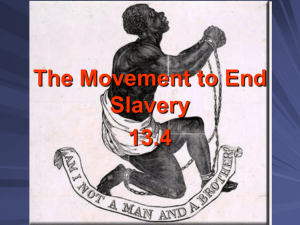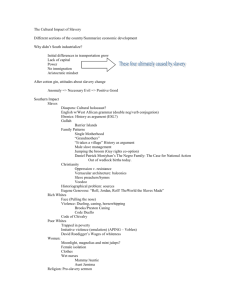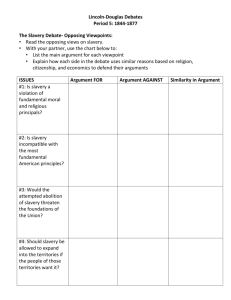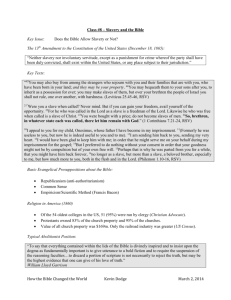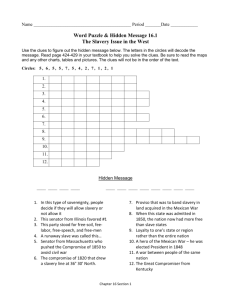part 2
advertisement
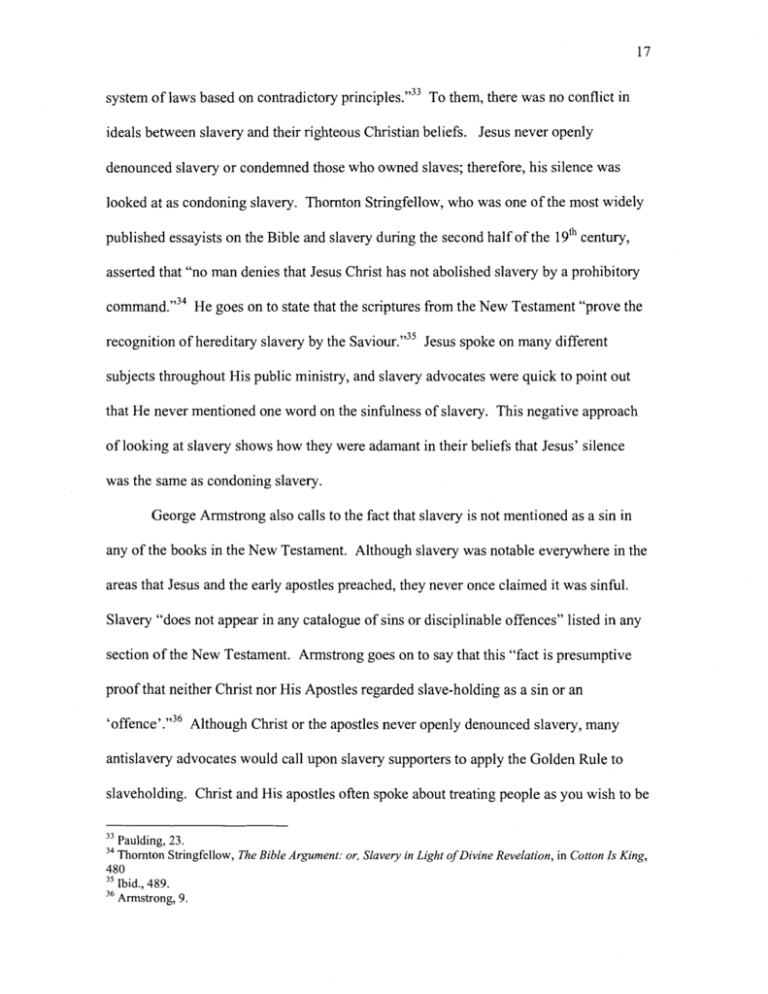
system of laws based on contradictory principles."33 To them, there was no conflict in ideals between slavery and their righteous Christian beliefs. Jesus never openly denounced slavery or condemned those who owned slaves; therefore, his silence was looked at as condoning slavery. Thornton Stringfellow, who was one of the most widely published essayists on the Bible and slavery during the second half of the l9lh century, asserted that "no man denies that Jesus Christ has not abolished slavery by a prohibitory command."34 He goes on to state that the scriptures from the New Testament "prove the recognition of hereditary slavery by the ~aviour."~'Jesus spoke on many different subjects throughout His public ministry, and slavery advocates were quick to point out that He never mentioned one word on the sinfulness of slavery. This negative approach of looking at slavery shows how they were adamant in their beliefs that Jesus' silence was the same as condoning slavery. George Armstrong also calls to the fact that slavery is not mentioned as a sin in any of the books in the New Testament. Although slavery was notable everywhere in the areas that Jesus and the early apostles preached, they never once claimed it was sinful. Slavery "does not appear in any catalogue of sins or disciplinable offences" listed in any section of the New Testament. Armstrong goes on to say that this "fact is presumptive proof that neither Christ nor His Apostles regarded slave-holding as a sin or an 'offence'."36 Although Christ or the apostles never openly denounced slavery, many antislavery advocates would call upon slavery supporters to apply the Golden Rule to slaveholding. Christ and His apostles often spoke about treating people as you wish to be 33 Padding, 23. Thornton Stringfellow, The Bible Argument: or, Slavery in Light of Divine Revelation, in Cotton Is King, 480 Ibid., 489. 36 Armstrong, 9. 34 treated. In the eyes of the abolitionists, there was no way slavery can be consistent with this type of teaching found throughout the gospels and the New Testament as a whole. Defenders of slavery had their own take on the Golden Rule that oftentimes left slavery critics baffled. As one abolitionist referred to the new spin on Jesus' message, these men were applying "the slave-holder's golden rule."" For proslavery enthusiasts, however, the Golden Rule proved that slaveholding is in fact not sinful. They often stated that the Golden Rule did not ask one to treat others how they would like to be treated but rather to treat others as if you would like to be treated if the roles were reversed. Some of these men even went so far as to say that the Golden Rule was "not so intended or understood by the first disciples and writers of the New ~ e s t a m e n t . "It~ ~is quite absurd that one could claim to understand the "true" meaning of the Golden Rule almost 2000 years since it was first spoken. Often these proslavery men cast themselves as being the real interpreters of God's word, which often gave them more voice in their churches and communities. This type of pretentious attitude helped these men gain the confidence they needed to stick to their argument until the last days of slavery. The slavery advocates believed that the Golden Rule meant that one should treat his neighbor as he would like to be treated if their positions were switched, and they had an array of ways to make this clear. Treating slaves with kindness is all the Golden Rule signified to slavery supporters. During a series of slavery debates in 1845, N.L Rice applied the Golden Rule to the everyday lives of men presented with the question of slavery. He gives the example of a slave that is burdened by a cruel master. Now this slave is already in a state of servitude that cannot be changed; therefore, if another man 37 38 Blanchard and Rice, 35 1. Priest. 329. bought this slave in order to improve his condition, he would be applying Jesus' Golden Rule. If a man lived in certain Southern states, he could not simply free his slaves, but he could try and improve his condition by treating them kindlynJYThe Golden Rule appears time and time again throughout Mr. Rice's speeches as one of the reasons slaveholding is not sinful. He stated that sometimes, the Golden Rule can make men into slaveholders; "because by becoming such they can greatly improve the condition of a suffering fellow~reature."~'To this statement, Rice found no rebuttal or reply from Rev. Jonathan Blanchard who was debating him on the topic of slavery. "ALL MEN HAD A MASTER IN HEAVEN." As proslavery writers dismissed the notion that the Golden Rule was not in accordance with slavery, they continued to apply different areas of the New Testament to the institution of slavery present in the southern states. These men were able to use the works of the early apostles as a prime example of why slavery is not to be looked upon as sinful. The passages from the New Testament often cited by slavery supporters were more concerned with how a slaveholder should act towards his slave than they were concerned whether or not slavery was right or wrong. The apostles "required the master to treat his slave according to the law of love, they did not command him to set him free."41 Everyone on earth was going to be judged by the same God because "all men 39 40 41 Blanchard and Rice, 86. Ibid., 256. Hodge, 852. had a master in heaven."42 If slavery was in fact sinful, slaveholders were going to be judged accordingly when they died. Saint Paul wrote numerous times about slavery in his New Testament letters. In Paul's letter to the Ephesians 6:5, he explicitly told slaves to "be obedient to your human masters with fear and trembling, in sincerity of heart." In his first letter to the Romans 13: 1-3, Paul stated that every man should be "subordinate to the higher authorities" because authorities "that exist have been established by God." He goes on to say that if one resist authority are openly opposing God. Paul's letters made it clear to slavery supporters that it was not against moral law to hold slaves. Paul affirmed again in Colossians 4: 1, that masters are only required to treat their "slaves justly and fairly." Proslavery advocates were quick to point out that Paul never told anyone to free their slaves because slavery was something that was established before his time, and he was in no position to resist establishments ordained by God. One of the most important arguments used by slavery advocates was Paul's Epistle to Philemon. In Paul's Epistle to Philemon, Paul is presented with a runaway slave. Instead of freeing the slave, Paul sends him back to his master after he converts him to Christianity. This passage became extremely important after the Fugitive Slave Act of 1850. This law stated that any federal marshal who did not arrest an alleged runaway slave could be fined $1,000. People suspected of being a runaway slave could be arrested without warrant and turned over to a claimant on nothing more than his sworn testimony of ownership. By applying the works of Paul to this new law, the proslavery supporters were able to scripturally legitimize their position. These men pointed out that 42 A Citizen of Georgia, Remarks upon Slavery, Occasioned by Attempts Made to Circulate Improper Publicatiom in the Southern States, in A Deferwe of Southern Slavery and other Pamphlets, 1 3 . Paul was only doing what was right and was guided by the Holy Spirit. It was also said that if he was "influenced by the spirit of some of our modem Abolitionists, he would probably have disregarded the master's rights in this case, and have encouraged the slave to continue in a course of disobedience." Even if Paul wanted to free the slave, he knew that he did not have the right to do so. According to Roman law, slaves were property, yet Paul "gave them no title to freedom" and required them to remain in their state "unless they could be madefree, in a lawful way."43 Proslavery writers would often comment that this type of respect for authority needed to be shown by the abolitionists. The situation Paul encountered was similar to that of the antebellum South because there was "no authority in any body of men" that could "destroy the relationships existing between masters and servants in this country, without the voluntary consent of the master himself."44 "EITHER MOSES OR THE ABOLITIONISTS MUST BE LIARS." After the proslavery advocates had laid out their argument as to how and why slavery was sanctioned by the Bible, they could go on the offensive and attack the abolitionists. The Bible affirmed their position on slavery, and one could only conclude that "either Moses or the abolitionists must be liars."45 Since the former was unquestionable, the latter must have been true. The proslavery advocates turned the table by using two common methods. First, they would repeatedly call for any antislavery writer to produce any biblical passage that Stringfellow, 482. Ibid., 15. 45 Paulding, 290. 43 44 openly condemned slavery. Since there were not arguments that were as explicit as those used by the defenders of slavery, this tactic proved rather effective. The second method they used was to cast the abolitionists as arrogant men who felt they lived a higher set of morals than that found in the Bible. Both of these methods were effective ways to get their point across, and many of these proslavery writers and speakers would use them whenever they had the chance. By consistently referring to scriptural passages to support their defense of slavery, the proslavery advocates found it necessary to challenge their adversaries in the North to use scripture to prove that slavery was in fact sinful. These men repeatedly asked the "Abolitionists to produce a single law of God forbidding [ ~ l a v e r y ] . "This ~ ~ idea resurfaces in many of the writings, with proslavery advocates constantly challenging abolitionists to find "a single precept of word, uttered by Jesus, or the Apostles, prohibiting s1ave1-y."~' They could confidently make these accusations, because they knew that any biblical argument thrown their way would be able to be rebutted one that was much stronger and more convincing. This "palpable ignorance of Divine was something the South would take no part in. According to the slavery advocates, if the abolitionists were willing to refuse what God had sanctioned in the Bible, then the authority derived from the Bible would diminish. Straying from God's word was something these men took very seriously, and they supposed that "the rejection of one fundamental doctrine of Christianity, necessarily 46 Samuel B. How, D.D., Slaveholding Not Sinful (New York: R & R Brinkerhoff, 1855; reprint, Freeport, New York: Books for Libraries Press, 1971), 26. 47 A Southern Clergyman, 6. 48 Stringfellow, 461. leads to the rejection of other."49 If one was to be a Christian, then they had to follow the Bible on every law, not just the ones they felt strongly about. Abolitionists were accused of not being true Christians, because when shown the passages in the Bible that sanctioned slavery, "they deny the Bible, and set up in its place a law of their own making." Proslavery advocates proclaimed that the Bible had been around for thousands of years, and it had been accepted and understood during the years before their time. The abolitionists were simply "construing and interpolating to accommodate it to their newfangled and ethereal code of moral^."'^ To the religious proslavery enthusiasts, the Bible was the true world of God and never changed throughout history. Proslavery writers would say that abolitionists only "profess to believe the Bible", but in all actuality were more talk than action.'' Professing to be a Christian and acting like one were two totally different things, and these men were willing to point out how the abolitionists were not able to back up their beliefs with the Bible. Alexander McCaine pointed this out in his speech given at the general conference of the Methodists Protestant Church in Baltimore in 1842. McCaine claimed that "the doctrine of the abolitionists is at war with the doctrine of the Bible. He continued to say how easily abolitionists point fingers at slaveholders and cast them off as sinners. The fact that they are often overlooking is that Abraham and many other figures in the Old Testament slaveholders, thus one could not certainly believe both abolitionists rhetoric and the teachings in the ~ i b l eSince . ~ ~the "Bible was the only true rule of right and wrong" to many defenders of slavery, it was obvious why "no abolitionist relies upon the Bible for 49 50 51 52 Blanchard and Rice, 257. The Pro-slavery Argument, 109. J.H. Hammond, Slavery in the Light ofPolitical Science, in Cotton is King, 676. McCaine, 86. proof.. .that slaveholding is in itself sinful."53 Slavery advocates were sticking to their guns instead of trying to "tear the Bible to pieces" in order to produce "a meaning foreign to its obvious sense."54 Even if abolitionists would resort to the messages in the Bible as a way to reject the institution of slavery, slavery supporters would not accept them because they were not convincing enough. Looking for deeper meanings was not acceptable when the literal word was sufficient. When antislavery writers and abolitionists used rhetorical and ethical arguments to denounce slavery, slavery defenders would accuse them of straying from "Bible language". They would demand passages from the Bible that explicitly opposed slavery and refused to take for granted any of the declarations made by them as being directly from the Bible. They would often take offense to the claims made by the abolitionists asking if they "think that we have no Bibles in the slave States, or that we are unable to read them."55 Thornton Stringfellow urged any man that opposed slavery to "look into the Bible, and see what is in it about slavery."56 The arguments laid forth by the advocates of slavery were much more convincing in their eyes because one did not have to read between the lines in order to figure out the true meaning. Slavery appeared throughout the Bible, and to them it was clear as day that God sanctioned slavery to be part of the world. To the proslavery advocates, the abolitionists simply did not have the right to denounce slavery, on the contrary, by using biblical evidence, they felt they were able to prove that abolitionists had "no authority to sustain their position that slavery is contrary Blanchard and Rice, 2 11. Hodge, 848. 5 5 Hammond, 676. 56 Stringfellow, 503. 53 54 to the law of ~ o d or" anathematize ~ ~ slaveholders as "thieves, robbers, and pirates"58 Slavery advocates could live with a clear conscience because they were confident that they knew what side of the slavery issue God was on. The attacks from the abolitionists became secondary because, "Slavery is not, in the sight of God, what it is in the sight of the abolitionist^."^^ To them, opinions were always changing throughout history, but the word of God was something that remained constant. Proslavery writers professed that the Bible claimed the same message for over thousands of years. The word of God needed to be revered and according to the supporters of slavery, the abolitionists were doing just the opposite. To go against God's teaching was blasphemy, and these Southerners would take no part in it whatsoever. George Armstrong, who was the pastor of the Presbyterian Church of Norfolk Virginia, was quick to point out that Northerners were simply "tampering with God's truth" by "wrestling the These men contended that the Bible could probably be interpreted in numerous ways that were contrary to its original meaning, and the abolitionists were the ones who "pervert[s] texts of ~ c r i ~ t u r e . "Some ~ ' writers would even call out specific individual abolitionists by name as away to legitimize their claim. During the Blanchard and Rice debates, Mr. Rice accuses "[William Lloyd] Garrison, and [Joshua] Leavitt, and [Gerrit] Smith" for "striking out new paths, and turning from the good old way of Bible truth."62 This passage serves a few purposes. First, it called on specific individuals to answer the claims put forth by the proslavery enthusiasts; 57 Padding, 14. McCaine, 83. Stringfellow, 5 18. 60 Armstrong, 145. 6' Albert Taylor Bledsoe, LL. D., Liberty and Slavery: or, Slavery in the Light ofMoral and Political Philosophy, in Cotton is King, 356. 62 Blanchard and Rice, 25 1. 5s 59 second, it accusing them of diverging from the paths that have already been set by the Bible for many years; third, it refers to Bible as the "good old way". The Bible was portrayed as the best way to deal with the question of slavery because it had been around for so many years. Everything that was in the Bible was put their for a purpose, and these proslavery advocates recognized that abolitionists and antislavery activists shied away from professing exact quotes from the Bible. The proslavery advocates used antislavery rhetoric as a way to show that the abolitionists held themselves to a higher standard than Jesus and the Apostles. They pointed out the position taken by the early Apostles in the early years of Christianity. Although slavery was "in many respects more severe," there was "no crusade instituted against it." The Apostles "did not go forth and organize Abolition Societies" or "disturb the civil relations." Proslavery writers pointed out that these men only preached the words of Jesus and the Old Testament. They were not in the position to overturn slavery because, according to proslavery writers, this was something that could only be done by ~ o d . ~During ' his slavery debates, Mr. Rice asked if the Apostles of Christ ever attacked this apparent sin. He answered his question by showing that Paul did not set out to destroy those who were unlike him like the pagans living in the Roman Empire. Instead of forming "a society against Paganism", the early Apostles "went amongst them and reason with them, face to face."64 Proslavery advocates claimed that if slavery was contrary to the will of God, the early Apostles would have at least mentioned it as being sinful. Albert Bledsoe commented that this silence on the subject of slavery must have 63 64 A Citizen of Georgia, 12. Blanchard and Rice, 107. appeared to be "exceedingly peculiar and anomalous to the abolitionist."" Silence was seen as acceptance, and the proslavery advocates claimed that the abolitionists acted in a way that was not in accordance with Jesus and His Apostles. By contrasting the abolitionists to Jesus and His Apostles, the proslavery supporters were able to make their antislavery opponents seem like they live by their own pompous set of morals. James Kirk Paulding brought this to the attention of his readers in his 1836 publication of Slavery in the United States. Paulding, like other proslavery writers, specifically pointed to William Lloyd Garrison and George Thomson as ones that are putting themselves on a higher standard than the Bible. He asks: "Can they perform miracles? Can they please the direct authority of the Son of God for their Mission?" He continues to ask his reader: "Are they more eloquent than the chosen disciples selected by the Saviour of mankind and his instruments for propagating the truths of ~ h r i s t i a n i t ~ ? " ~ ~ By doing this, Paulding was making the reader choose between either the precepts in the Bible or the abolitionists. The way Paulding asks these questions, it seems as if he is asking them, "Do you think you are better than us?" Paulding and the other proslavery writers relied almost exclusively on biblical texts to support their claims; therefore, acting in a way that looked down on these claims was to be portrayed in a very negative way. If the Bible was correct, then the abolitionists had to be wrong. The idea that "what God ordains, and Christ sanctifies, should surely command the respect and toleration of man,"67 is an idea that is present throughout much of the proslavery literature sampled for this essay. In Governor Hammond's letters on slavery, he said that the abolitionists refer to "a religion too pure and elevated for the Bible; which seeks to 65 Bledsoe, 347. Paulding, 3 1. 67 The Pro-slavery Argument, 109. 66 erect among men a higher standard of morals that the Almighty has revealed." He continued to proclaim that these men, who are "professing to be holy men," and were more interested in their self-righteous ways than the examples found in the ~ i b l e . ~This ' is part of the reason Southern Christians became "shocked and offended" when they were told that they are "guilty of a heinous crime" that "Christ and his apostles never denounced." These men were able to find reconciliation in the fact that "their accusers can not be wiser or better than their divine aster."^^ These men claimed that they could not "shut our eyes to these facts" that showed that the words of the abolitionists were in conflict with the words found throughout the ~ i b l e . " By portraying the abolitionists as the ones who were breaking God's will, these men were simultaneously making themselves out to be the victims in this debate over slavery. They portrayed themselves as these lowly Christians who were only doing what God had sanctioned in both Testaments of the Bible. They claimed to be humble followers of Christ, and even if they did feel slavery was wrong, they did not have the authority to overrule it. For just as one could not destroy the relationship between a servant and his master without the master's permission, slavery supporters were not willing to question slavery without God's permission. The relationship between the antislavery and proslavery sects in America from 1830-1860 is very complex. On one hand you had the abolitionists that were denouncing slavery based on ethical and moral dilemmas. On the other hand, you had the proslavery advocates condoning slavery based upon the literal words written in the Bible. Both of these groups professed to be adherent to the Christian faith, yet there was no way they 69 O' The Pro-Slavery Argument, 108 Hodge, 85 1 . Ibid., 848. could see eye to eye on the subject of slavery when referring to the Bible. The proslavery advocates were able to use the scriptural argument so fluently because they knew that the Bible did not have any passages that could "prove" that what they were claiming was incorrect. Another reason why the religious element was of such great importance was that it applied equally to both sides of the argument. Both sides were Christian and both sides used the Bible as their book of worship. The economic and political interests could be broken down into geographical regions, but the moral questions of slavery really hit home to both sides. It was one thing to say that something is wrong, but it was a completely different thing to say something was a sin in the eyes of God. This debate only sparked the proslavery argument into a fire that was going to be hard to control. By looking at both the New and Old Testaments of the Bible, the defenders of slavery were able to prove, according to them, that slavery was acceptable in the eyes of God. Once this argument had been made they were in a position to turn the tables and question the motives of the abolitionists. If Christ did not think slavery was a sin, how could an abolitionist claim it was sinful yet still profess to be a Christian? This question was one that proslavery writers, preachers, and speakers were able to use to their advantage while they were trying to prove that the way they interpreted the Bible was the correct way. The Bible can be one of the most wonderful books in the world and at the same time can be used to justify many evils of the world. If one looks hard enough and makes enough connections, the Bible can support a myriad of different claims. Christian proslavery advocates were so concerned with what the Bible had to say about slavery, they lost focus of what was supposed to be the center of their Christian faith: love. Christians are not supposed to separate people into classes, colors, or races, but instead looks at every human being as a unique individual. These Christians were able to convince themselves that what they were doing was acceptable in the eyes of God, but in all actuality it was probably far from it. Saint Paul stated it best in his first letter to the Corinthians 7:22-23 when he said that "the slave called in the Lord is a freed person in the Lord, just as the free person who has been called is a slave of Christ." For according to Christian teaching, one is only slave to Christ and never another human being. Everyone is equal in the eyes of God, and Jesus explained that often times the last person on earth will be the first into Heaven and the first person on Earth shall be last. Religious proslavery advocates ignored the ethical dimension of the Gospels in their defense of slavery. One might see the phrase "Christian slaveholder" as quite the oxymoron when one examines the topic a hundred and forty years after slaves were emancipated in the United States Works Consulted Ahlstrom, Sidney E. A Religious History of the American People. New Haven: Yale University Press, 1972. Armstrong, George D. The Christian Doctrine of Slavery. 1857, Reprint, New York: Negro Universities, 1969. Blanchard, Jonathan and N.L. Rice. A Debate on Slavery. Cincinnati: Wm. H . Moore & Co., Publishers, 1846; Reprint, New York: Arno Press, Inc., 1969. Daly, John Patrick. When Slavery Was Called Freedom. Lexington: The University Press of Kentucky, 2002. Davis, David B., The Problem of Slavery in Western Culture. New York: Oxford University Press, 1966. A Defense of Southern Slavery and Other Pamphlet. n.p. 1835- 1863; Reprint, New York: Negro University Press, 1969. Elliot, Ebenezer Newton, ed., Cotton Is King, and Pro-Slavety Arguments: Comprising the Writings of Hammond, Harper, Christy, String;fellow,Hodge, Bledsoe, and Cartwright, on This Important Subject. Augusta, Ga: Pritchard, Abbott & Loomis, 1860; Reprint, New York: Johnson Reprint Corporation, 1968. Faust, Drew Gilpin, ed. The Ideology Of Slavery. Baton Rouge: Louisiana State University Press, 1981. Finkelman, Paul, ed. Articles on American Slavery: Proslave~yThought, Ideology, and Politics. New York: Garland Publishing, Inc., 1989. Genovese, Eugene D. The World the Slaveholders Made: Two Essays in Interpretation. New York: Pantheon Books, 1969. Haynes, Stephen R. Noah's Curse: The Biblical Justzjkation ofAmerican Slavery.. New York: Oxford University Press, 2002. How, Samuel Blanchard. Slaveholding Not Sinful. New York: R & R Brinkerhoff , 1855; Reprint, New York: Books for Libraries Press, 1971. Jenkins, William Sumner. Pro-Slavery Thought in the Old South. Chapel Hill: 1935; Reprint, 1960. Lowance, Mason I. Jr., ed. A House Divided: The Antebellum Slavery Debates in America, 1776-1865. Princeton: Princeton University Press, 2003. Mathews, Donald G. Religion in the Old South. Chicago: The University of Chicago Press, 1977. McKitrick, Eric L. ed. Slavery Defended: the views of The Old South. Englewood Cliffs, NJ: Prentice-Hall, Inc., 1963. McKivigan, John R. and Mitchell Snay, eds. Religion and the Antebellum Debate over Slavery. Athens: The University of Georgia Press, 1998. Oakes, James. The Ruling Race: A History of American Slaveholders. New York: Random House, 1982. Paulding, James Kirk. Slavery in the United States. Harper & Brothers, 1836; Reprint, New York: Negro Universities Press, 1968. Priest, Josiah. Slavery as It Relates to the Negro or African Race. Albany: C. Van Benthuysen and Co., 1843. Reprint, New York: Arno Press Inc., 1977. The Pro-Slavery Argument: as Maintained by the Most Distinguished Writers of the Southern States, Containing the Several Essays on the Subject, of Chancellor Harper, Governor Hammond, Dr. Simms, and Professor Dew. Charleston: Walker, Richards & Co., 1852; Reprint, New York: Negro Universities Press, 1968. Smith, H. Shelton. In His Image, But ...Racism in Southern Religion, 1780-1910. Durham, NC: Duke University Press, 1972. Tise, Lany E. Proslavery: A History of the Defense of Slavery in America, 1701-1840 Athens: University of Georgia Press, 1987. Weld, Theodore. The Bible Against Slavery: An Inquiry into the Patriarchal and Mosaic Systems on the Subject of Human Rights. New York: American Anti-Slavery Society, 1838 Wood, Forrest G. The Arrogance of Faith New York: Alfred A. Knopf, Inc., 1990.


